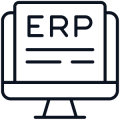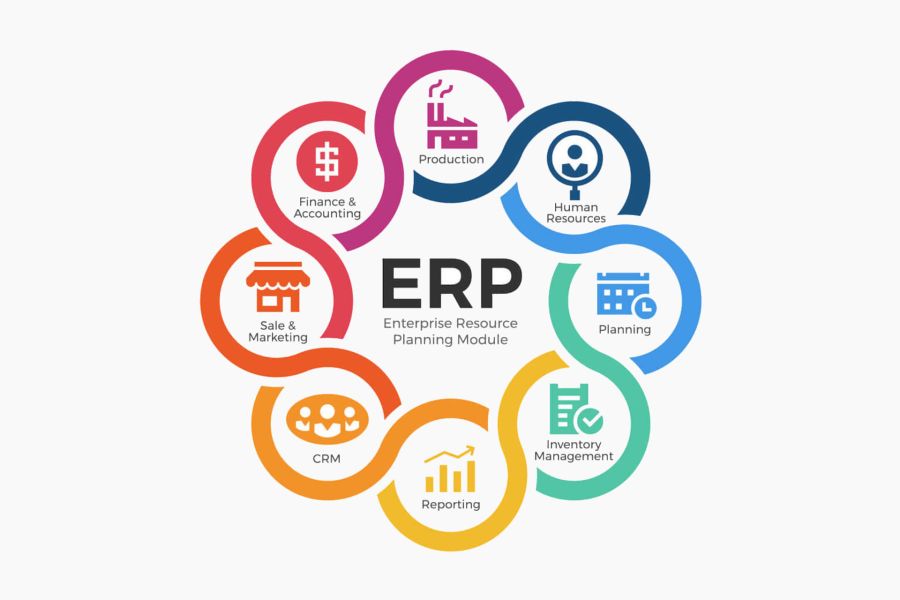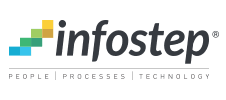ERP
Enterprise Resource Planning
Automate all your enterprise functions for every department of your company.
Get faster and more accurate access to the information and history of your customers.

What is ERP?
ERP (Enterprise Resource Planning) is a system that automates and integrates key business processes, such as taking customer orders, scheduling operations, and maintaining inventory and financial records.
They are designed around a single, defined data structure (schema) that usually has a common database. This helps ensure that information used across the enterprise is normalized and based on common definitions and user experiences.
These core constructs are then interconnected with business processes driven by workflows across various business departments (e.g. accounting, finance, payroll, human resources, engineering, marketing, operations), connecting systems and the people who use them. Simply put, ERP is the vehicle for integrating people, processes and technologies in a modern enterprise.
Complete Software Automation
In general, ERP refers to the complete software automation of any business, designed to record and more effectively operate your company's data & information for each department or human resource that needs it to better fulfill their role and responsibility. ERP also ensures that these data fields and attributes appear in the correct account in the company's general ledger, so that all costs are tracked and represented correctly.
Multiple tools
ERP systems have multiple tools to help with the overall digitization and management of business performance and are connected to CRM programs for more complete information and performance. They offer intelligence, visibility, analysis and efficiency to every aspect of the departments of any business.
A basic ERP principle is the central collection of data for widespread distribution. Instead of multiple standalone databases with an endless supply of disconnected spreadsheets, ERP systems bring order to chaos so that all users - from the CEO to the accounts payable clerks - can create, store and use the same data that results from common processes. With a secure and centralized database, everyone in the organization can be sure that the data is correct, up-to-date and complete. Data integrity is ensured for every task performed across the organization, from a quarterly financial statement to an outstanding claims report, without relying on error-prone spreadsheets.
What does ERP offer me?
Reduces costs and saves money
Reduces administrative and operational costs through automated processes. This allows users to actively manage operations and prevent delays.
Reducing operational costs is reducing working capital expenditure. An ERP system allows you to run your business more economically.
Reduces “waste” in your organization and maximizes inventory efficiency.
Simplifies business processes and operations
Data is available in a central location with full visibility across all operations. An ERP system allows you to automate business processes. Decision makers can monitor operations and production in real time.
It automates multiple tracking processes and accurately determines and maintains inventory levels.
Improves financial integration
Without ERP, many businesses are forced to use different programs in different departments. An ERP system eliminates the data silos that arise from different systems.
It also allows you to reduce many time-consuming, labor-intensive actions.
Delivers satisfaction, service
Implementing an ERP solution allows you to produce the right product at the right time. This ensures accuracy in meeting customer needs.
On-time delivery is critical to maintaining customer relationship retention and service.
Simplifies the supply chain
A robust ERP system enables real-time visibility into your supply chain and other processes that make it easier for decision makers to gain a broader view of their supply chain, reduce planning cycles, and stay on top of production planning.
Responds faster to market conditions with data analytics
Provides real-time data analysis and reporting to help the business react quickly to changing market demands. The business can make timely decisions.
Data analytics in ERP software provides access to accurate reports. This allows businesses to monitor trends in real time and determine realistic forecasts.
Provides Traceability
Inventory allocation and tracking is critical.
ERP helps you track inventory, defects, and risks down to the level of individual parts and components.
Track materials from receipt to delivery to the customer, and anywhere in between, within the timeframes and frameworks set by the business.
Get an ERP system immediately and:
-
Transform digitally and house the future of your business with agility and efficiency.
-
Grow and adapt to your changing needs.
-
Gain better control over your business with choice in deployment. Whether on-premise, in the cloud (Cloud ERP) or as a mobile application (Mobile ERP).
-
Increase competitiveness.
-
Gain a competitive advantage with compliance, agility and the ability to expand and adapt with little to no downtime.








